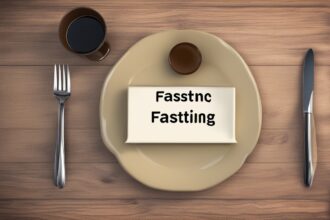Have you ever wondered, what is fasting, and why it’s become such a buzzword in the health and wellness community? fasting, at its core, is the practice of abstaining from food and sometimes drink for a specific period. It’s not just a modern trend—fasting has been part of human history for centuries, rooted in cultural, spiritual, and health practices. Whether you’re curious about intermittent fasting for weight loss or exploring fasting for mental clarity, this guide will break it all down for you. Let’s dive into the science, benefits, and practical ways to incorporate fasting into your life, while addressing common questions like “what is fasting good for” and “how does fasting work?”
The Basics: What is Fasting?
At its simplest, fasting means voluntarily refraining from eating for a set duration. But there’s more to it than just skipping meals. Fasting can vary in length, purpose, and method, depending on personal goals or cultural traditions. Historically, fasting has been used for religious reasons, such as during Ramadan in Islam or Lent in Christianity, but today, many people turn to fasting for health benefits like improved metabolism and weight management. When we ask, what is fasting in a health context, it often refers to structured eating patterns that alternate between periods of eating and abstaining.
Different Types of Fasting Explained
Not all fasting is the same, and understanding the various types can help you choose what works best for you. Here are some popular fasting methods that answer the question, what is fasting in practice:
- Intermittent Fasting (IF): This involves cycling between eating and fasting periods, such as the 16/8 method (16 hours of fasting, 8 hours of eating) or the 5:2 approach (eating normally for 5 days and restricting calories for 2).
- Water Fasting: A more intense form where only water is consumed for a set period, often 24–72 hours, under medical supervision.
- Juice Fasting: This involves consuming only fruit or vegetable juices to detoxify the body while still providing some nutrients.
- Religious Fasting: Practiced for spiritual reasons, such as abstaining from food and drink from dawn to dusk during Ramadan.
Each type has its own purpose, whether it’s for physical health, mental clarity, or spiritual growth. Knowing what is fasting in these contexts helps tailor it to your lifestyle.
The Science Behind Fasting: How Does It Work?
So, what is fasting doing to your body on a scientific level? When you fast, your body undergoes several physiological changes. After about 8–12 hours without food, your glucose stores (glycogen) deplete, and your body starts burning fat for energy through a process called ketosis. This is why fasting is often linked to weight loss. Additionally, fasting triggers autophagy—a cellular “clean-up” process where damaged cells are repaired or removed, potentially reducing inflammation and slowing aging.
Studies, such as those published in the journal Cell Metabolism, show that intermittent fasting can improve insulin sensitivity, lower blood pressure, and even enhance brain function by increasing levels of brain-derived neurotrophic factor (BDNF). So, when people ask, “what is fasting good for,” the answer often lies in these cellular and metabolic benefits.
Health Benefits of Fasting: Why Try It?
Now that we’ve covered what is fasting, let’s explore why it’s worth considering. The potential benefits of fasting are backed by science and personal anecdotes alike, making it a compelling tool for wellness.
- Weight Management: Fasting reduces calorie intake and boosts fat-burning, helping with weight loss or maintenance.
- Improved Metabolic Health: It can lower blood sugar levels and improve insulin resistance, reducing the risk of type 2 diabetes.
- Enhanced Mental Clarity: Many report sharper focus during fasting due to stable energy levels from ketosis.
- Longevity and Anti-Aging: Autophagy and reduced oxidative stress may slow aging at the cellular level.
- Digestive Rest: Giving your gut a break can improve digestion and reduce bloating or discomfort.
While these benefits are promising, it’s important to approach fasting with realistic expectations and consult a healthcare provider if you have underlying conditions.
Practical Tips for Starting Your Fasting Journey
Understanding what is fasting is just the first step—putting it into practice can feel daunting. Here are some beginner-friendly tips to ease into fasting safely and sustainably. Start small and listen to your body. Fasting isn’t a one-size-fits-all solution, so customize it to your needs. Remember, the goal isn’t deprivation but rather a mindful approach to eating.
First, choose a fasting method that aligns with your schedule. For instance, the 16/8 intermittent fasting plan works well for busy lifestyles since you can skip breakfast and eat between noon and 8 PM. Stay hydrated by drinking plenty of water, especially during fasting windows, to curb hunger and support detoxification. Lastly, break your fast gently with nutrient-dense foods like vegetables, lean proteins, or whole grains to avoid digestive upset.
Common Myths and Misconceptions About Fasting
When exploring what is fasting, you might encounter myths that can deter you from trying it. One common misconception is that fasting means starving yourself. In reality, fasting is a controlled and intentional practice, not deprivation. Another myth is that it slows metabolism—research shows that short-term fasting can actually boost metabolic rate by increasing norepinephrine levels. Finally, some believe fasting isn’t safe for everyone. While it’s true that pregnant women, children, and those with certain medical conditions should avoid it, fasting can be safe for most healthy adults when done correctly. Always seek professional advice if you’re unsure.
In conclusion, understanding what is fasting opens the door to a powerful health tool that’s been practiced for centuries. Whether you’re drawn to intermittent fasting for weight loss, water fasting for detoxification, or simply want to explore its mental and physical benefits, there’s a method for everyone. The key is to start slowly, stay informed, and prioritize your well-being. Fasting isn’t just about skipping meals—it’s about giving your body and mind a chance to reset and thrive. So, why not give it a try? Share your thoughts or experiences with fasting in the comments below, and let’s keep the conversation going on how fasting can fit into a balanced, healthy lifestyle.






